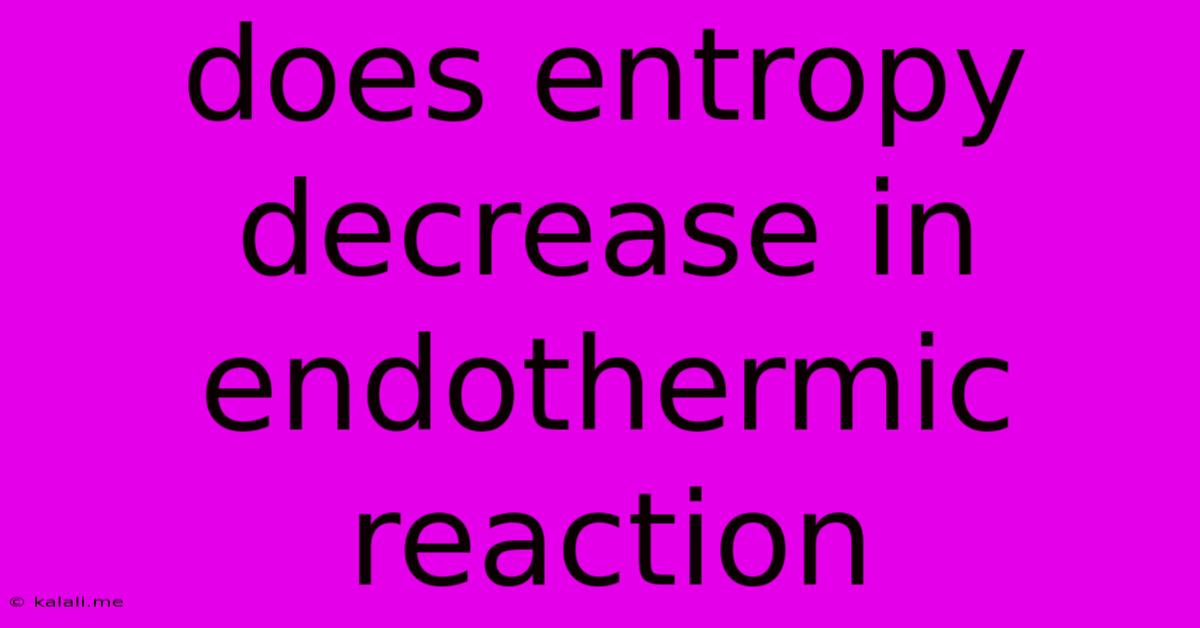Does Entropy Decrease In Endothermic Reaction
Kalali
Jun 07, 2025 · 3 min read

Table of Contents
Does Entropy Decrease in Endothermic Reactions? A Detailed Look
Meta Description: Explore the complex relationship between endothermic reactions and entropy. Learn whether entropy always decreases in endothermic processes and understand the factors that influence entropy change. We'll break down the concepts clearly and concisely.
Endothermic reactions, those that absorb heat from their surroundings, often spark confusion regarding their impact on entropy. While a common misconception links endothermic reactions with a decrease in entropy, the truth is more nuanced. The change in entropy (ΔS) during a reaction depends on several factors, not solely the heat exchange. Let's delve into the details.
Understanding Entropy
Before we tackle endothermic reactions, let's clarify entropy. Entropy (S) is a thermodynamic property representing the randomness or disorder of a system. A higher entropy value indicates greater disorder. Changes in entropy (ΔS) during a reaction signify a change in the system's disorder. A positive ΔS indicates an increase in disorder, while a negative ΔS signifies a decrease.
Endothermic Reactions and Heat Absorption
Endothermic reactions absorb heat from their surroundings. This heat absorption increases the kinetic energy of the reactants, potentially leading to increased molecular motion and disorder. This effect often contributes to a positive ΔS. However, this is not the sole determining factor.
The Role of System Organization
The overall change in entropy depends not only on the heat absorbed but also on the degree of organization or disorder of the reactants and products. Consider these scenarios:
-
Increased Disorder: If an endothermic reaction leads to an increase in the number of gaseous molecules, or a transition from a more ordered solid state to a less ordered liquid or gaseous state, the entropy will likely increase (positive ΔS). This is because gases have higher entropy than liquids, and liquids have higher entropy than solids.
-
Decreased Disorder: Conversely, if an endothermic reaction results in a decrease in the number of gaseous molecules, or a transition from a less ordered state to a more ordered state (e.g., polymerization), the entropy may decrease (negative ΔS), despite the heat absorption.
Gibbs Free Energy: The Deciding Factor
The spontaneity of a reaction, whether it's endothermic or exothermic, is ultimately determined by the Gibbs Free Energy (ΔG). The Gibbs Free Energy equation is:
ΔG = ΔH - TΔS
where:
- ΔG = change in Gibbs Free Energy
- ΔH = change in enthalpy (heat absorbed or released)
- T = temperature in Kelvin
- ΔS = change in entropy
For a reaction to be spontaneous (occur without external input), ΔG must be negative. In an endothermic reaction (ΔH is positive), a positive ΔS can make ΔG negative, particularly at higher temperatures. Therefore, even though heat is absorbed, the increase in entropy can still drive the reaction forward.
Examples
Consider the melting of ice. This is an endothermic process (heat is absorbed to break the bonds holding the water molecules in a solid structure). The entropy increases because the liquid water is more disordered than the solid ice.
Conversely, the formation of a complex molecule from smaller units might be endothermic but result in a decrease in entropy due to the increased order in the product.
Conclusion
In summary, the statement "entropy decreases in endothermic reactions" is an oversimplification. While heat absorption can contribute to a positive entropy change, the overall change in entropy depends on numerous factors, including the change in the number and type of molecules and their respective phases. The spontaneity of an endothermic reaction is ultimately dictated by the Gibbs Free Energy, which considers both enthalpy and entropy changes. Therefore, while an endothermic reaction might lead to a decrease in entropy under specific circumstances, it's not a universal rule.
Latest Posts
Latest Posts
-
Sudo Apt Get Install Xinetd Tftpd Tftp
Jun 07, 2025
-
Cannot Execute Required File Not Found Linux
Jun 07, 2025
-
How Do You Write Song Lyrics In An Essay
Jun 07, 2025
-
What Does It Mean When Someone Age Is M
Jun 07, 2025
-
Why Did Johan Want To Be With The Old Man
Jun 07, 2025
Related Post
Thank you for visiting our website which covers about Does Entropy Decrease In Endothermic Reaction . We hope the information provided has been useful to you. Feel free to contact us if you have any questions or need further assistance. See you next time and don't miss to bookmark.